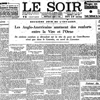National Content: Belgium
Invasion, second day – The Anglo-Americans bring fresh supply of troops between the Vire and the Orne.
| Source | "Le Soir", the 7th of June 1944 – First page |
| Event referred to | 6th of June 1944 – D-Day |
| Technological characteristics | Type of file: Image Extension : pdf Characteristics Dimension of the file: 1300 Ko Availability proposed: pdf document with zoom options |
| Description of the source | Kind of source: Newspaper article Origin of the source: Archives of the National Library of Belgium, Brussels Language: French Copyright issues: reproduction and pedagogical exploitation authorized in the framework of the MHM project |
| Contextualisation of the source | « Le Soir » is one of the most important newspapers in Belgium. Sequestered by the German authorities in 1940, it was published from 14th June 1940 till 3rd September 1944 under the same title than before the war, but giving of course the point of view of the German occupant. It was called in Belgium, during the war, “Le Soir volé”, i.e.” the stolen Soir”. |
| Interpretation of the source | On 7th June 1944, the newspaper « Le Soir » titles on its first page : “Invasion, second day. The Anglo-Americans bring fresh supply of troops between the Vire and the Orne”. The totality of the first page is dedicated to the event. The newspaper is under control, all the sources are of German origin. The author relates the landing operations underlining the failure of the allied operation since he affirms that “the first day ended entirely in favour of the Germans”. He speaks about “heavy losses for the allied forces which have been destroyed”, adding that they have been “rejected (to the sea) after very violent fights”. For instance, speaking in that way about the American parachutists of the 82th and the 101th airborne divisions, he affirms that “the American division has been destroyed. No one could escape”. Regarding the landing troops, the bridgehead would be constituted of a 15 – 20 km long and 1,5 km deep strip of beach. The numbers quoted by the journalist are sometimes fanciful. He advances that “a 500 gliders British force has been destroyed during the night” or that the German counterattack has led to the “destruction of the enemy”, i.e. the British and Canadian forces landed in the north of Bayeux, Isigny and Caen. We know the reality about that. Further, he stresses on the bad weather conditions that have seriously bothered the allied aviation, the allied marine as well as the allied landing forces. However, he wonders about the skills of General Eisenhower : “why didn’t he choose a dark, misty night without moon ?” and “why did he only trust to the meteorologists’ advices?”. “Le Soir” also reproduces the communiqué of the German high commandment. For our analysis, it is interesting to notice how much the tone and the news given by this communiqué entirely correspond to what the journalist reports. The self confidence, the stress laid on the importance of the forces engaged by the Anglo-Americans, the strong resistance of the German forces as well as the very heavy losses suffered by the “enemies” are shown through in all articles. Regarding the comments, the journalist reports the deep quiet or even the relief of the Berlin population and of the German staff while getting the news of the landing. He affirms that all has been planned, that the German army is ready to drive back the “invaders” and that this deciding fight will put an end to World War II. Moreover, he reports Marshal Pétain and Pierre Laval’s call to the French population, inviting it not to take part into the military operations and to keep quiet. In short, the newspaper “Le Soir” relates the event from a strictly military point of view. In comparison with other collaborator newspapers, there are very little derogatory words regarding the allied forces or pro-Nazi value judgments. On the other hand, the information comes exclusively from German sources and it is treated in a fanciful way, so we can notice how far from reality the allegations of the journalist are. |
| Original Contents | |
| Original Contents (English Translation) |
